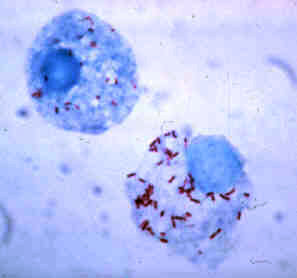Intracellular bacteria
Intracellular Bacteria[edit | edit source]
Intracellular bacteria are a group of bacteria that can live and replicate inside the cells of a host organism. These bacteria have evolved mechanisms to invade host cells and evade the host's immune system. They are responsible for a variety of diseases in humans and animals.
Types of Intracellular Bacteria[edit | edit source]
Intracellular bacteria can be classified into two main types based on their lifestyle:
Obligate Intracellular Bacteria[edit | edit source]
Obligate intracellular bacteria are those that can only survive and replicate within the cells of a host. They are unable to live outside of host cells for extended periods. Examples include:
Facultative Intracellular Bacteria[edit | edit source]
Facultative intracellular bacteria can live both inside and outside of host cells. They have the ability to survive in the extracellular environment but can also invade host cells when necessary. Examples include:
Mechanisms of Intracellular Survival[edit | edit source]
Intracellular bacteria have developed various strategies to survive and replicate within host cells. These include:
- Inhibition of phagosome-lysosome fusion: Some bacteria, such as Mycobacterium tuberculosis, prevent the fusion of phagosomes with lysosomes, allowing them to survive within macrophages.
- Escape from the phagosome: Bacteria like Listeria monocytogenes can escape from the phagosome into the cytoplasm, where they can replicate freely.
- Modification of the host cell environment: Intracellular bacteria can alter the host cell's environment to create a niche that supports their survival and replication.
Diseases Caused by Intracellular Bacteria[edit | edit source]
Intracellular bacteria are responsible for a range of diseases, including:
- Rocky Mountain spotted fever: Caused by Rickettsia rickettsii, this disease is transmitted by ticks and characterized by fever, rash, and potentially severe complications.
- Chlamydia infection: Caused by Chlamydia trachomatis, this is a common sexually transmitted infection that can lead to serious reproductive complications if untreated.
- Tuberculosis: Caused by Mycobacterium tuberculosis, this disease primarily affects the lungs but can also affect other parts of the body.
Related Pages[edit | edit source]
| Microbiology: Bacteria | ||||||||||||||||||||||||
|---|---|---|---|---|---|---|---|---|---|---|---|---|---|---|---|---|---|---|---|---|---|---|---|---|
|
Search WikiMD
Ad.Tired of being Overweight? Try W8MD's physician weight loss program.
Semaglutide (Ozempic / Wegovy and Tirzepatide (Mounjaro / Zepbound) available.
Advertise on WikiMD
|
WikiMD's Wellness Encyclopedia |
| Let Food Be Thy Medicine Medicine Thy Food - Hippocrates |
Translate this page: - East Asian
中文,
日本,
한국어,
South Asian
हिन्दी,
தமிழ்,
తెలుగు,
Urdu,
ಕನ್ನಡ,
Southeast Asian
Indonesian,
Vietnamese,
Thai,
မြန်မာဘာသာ,
বাংলা
European
español,
Deutsch,
français,
Greek,
português do Brasil,
polski,
română,
русский,
Nederlands,
norsk,
svenska,
suomi,
Italian
Middle Eastern & African
عربى,
Turkish,
Persian,
Hebrew,
Afrikaans,
isiZulu,
Kiswahili,
Other
Bulgarian,
Hungarian,
Czech,
Swedish,
മലയാളം,
मराठी,
ਪੰਜਾਬੀ,
ગુજરાતી,
Portuguese,
Ukrainian
Medical Disclaimer: WikiMD is not a substitute for professional medical advice. The information on WikiMD is provided as an information resource only, may be incorrect, outdated or misleading, and is not to be used or relied on for any diagnostic or treatment purposes. Please consult your health care provider before making any healthcare decisions or for guidance about a specific medical condition. WikiMD expressly disclaims responsibility, and shall have no liability, for any damages, loss, injury, or liability whatsoever suffered as a result of your reliance on the information contained in this site. By visiting this site you agree to the foregoing terms and conditions, which may from time to time be changed or supplemented by WikiMD. If you do not agree to the foregoing terms and conditions, you should not enter or use this site. See full disclaimer.
Credits:Most images are courtesy of Wikimedia commons, and templates, categories Wikipedia, licensed under CC BY SA or similar.
Contributors: Prab R. Tumpati, MD

